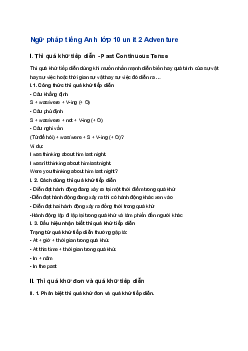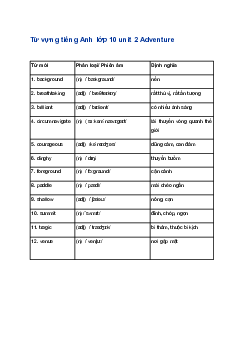





Preview text:
Giải Unit 2 Lớp 10: 2C Listening trang 25 Bài 1
Put the adjectives below into three groups: describing a) people, b) extreme
sports and c) landscapes. Some adjectives can go into more than one group.
(Xếp các tính từ bên dưới thành ba nhóm: mô tả a) người, b) thể thao mạo hiểm. c)
phong cảnh. Một vài tính từ có thể xếp vào nhiều hơn một nhóm.)
Adjectives to describe adventure athletic brave impressive remote risky spectacular strong terrifying thrilling Gợi ý đáp án
People: athletic (lực lưỡng ) , brave (dũng cảm) , impressive (oai vệ) , strong (khỏe
mạnh) , terrifying (kinh hãi)
Extreme sports: risky (liều lĩnh) , spectacular (thu hút sự chú ý) , terrifying (hoảng sợ) ,
thrilling (rùng mình)
Landscapes: impressive (ấn tưởng) , remote (hẻo lánh) , spectacular (hung vĩ) Bài 2
Describe the photo above. Where are the people? What are they doing? What
kind of people do you think they are? Use adjectives from exercise 1 and words
from lesson 2A on page 18.
(Mô tả bức tranh bên dưới. Những người này đang ở đâu? Họ đang làm gì? Bạn nghĩ
những người này là những ai? Sử dụng các tính từ trong bài tập 1 và các từ vựng
trong bài 2A trang 18.) Gợi ý đáp án
They are in the top of a very high and steep mountain. They are going skydiving. ( Họ
đang ở trên một ngọn núi cao và dốc. Họ đang chơi nhảy dù.) Bài 3
Read the Listening Strategy. Then listen to six people talking about BASE
jumping. Write the synonyms or words with the opposite meaning that they use
for the underlined words.
(Đọc Chiến thuật nghe. Sau đó nghe sáu người nói về môn nhảy dù mạo hiểm. Viết từ
đồng nghĩa hoặc từ có nghĩa trái nghĩa với từ họ dùng cho các từ được gạch chân.)
Listening Strategy (Chiến thuật nghe)
The information that you need to understand in the recorded text may be expressed differently in the task.
(Thông tin bạn cần hiểu trong đoạn băng có thể được thể hiện khác đi trong câu hỏi.)
Listen out for synonyms of key words in the task. Key words are content words such
as adjectives, nouns and verbs.
(Nghe rõ từ đồng nghĩa của từ khóa trong câu hỏi. Từ khóa là những từ như tính từ,
danh từ và động từ.)
Listen out, too, for ways in which words with the opposite meaning, or negative verbs,
correspond with key words in the task.
(Tương tự, nghe ra những từ với có nghĩa trải ngược, hoặc những động từ phủ định,
tương ứng với các từ khóa trong câu hỏi.)
It’s rather cold today. >> It isn’t very warm today. (Trời hôm nay khá lạnh. >> Trời
hôm nay không được ấm lắm.)
We won the match. >> We didn’t lose the match. (Chúng tôi đã thắng trận đấu. >>
Chúng tôi đã không để thua trận đấu.)
1. Fred loves being in wild, far-away places. remote (Fred thích đến những nơi hoang dã, xa xôi.)
2. Sally says BASE jumping isn't popular with older people. (Sally nói rằng nhảy dù
mạo hiểm không phổ biến với người già.)
3. Chris doesn't consider himself a courageous person. (Chris không cho rằng mình là người can đảm.)
4. Celina says people who aren't strong and fit shouldn't try BASE jumping. (Celina
nói rằng những người không khỏe và cân đối không nên thử nhảy dù mạo hiểm.)
5. For Shelley, the appeal of BASE jumping is the breathtaking landscapes where you
do it. (Với Shelly, sự hấp dẫn của nhảy dù mạo hiểm là phong cảnh ngoạn mục ở nơi
thực hiện nhảy dù.)
6. Martin really didn't enjoy BASE jumping. (Martin thực sự không thích nhảy dù mạo hiểm lắm.) Bài 4
Read the sentences. Can you think of synonyms for any of the underlined words?
Write them in your notebook.
(Đọc các câu sau. Bạn có thể nghĩ ra từ đồng nghĩa nào cho các từ được gạch chân
không? Viết chúng vào trong vở.)
1. Tanya likes extreme sports because they're dangerous . (Tanya thích thể thao mạo
hiểm vì chúng nguy hiểm.)
2. A friend told Tanya to try BASE jumping. (Một người nói Tanya thử nhảy dù mạo hiểm.)
3. Tanya didn't enjoy her first experience of BASE jumping. (Tanya không thích trải
nghiệm đầu tiên nhảy dù mạo hiểm của cô ấy lắm.)
4. The cliffs in Tonsai, Thailand are the perfect venue for BASE jumping, in Tanya's
opinion. (Những dốc núi ở Tonsai, Thái Lan là nơi hoàn hảo cho nhảy dù mạo hiểm,
theo quan điểm của Tanya.)
5. Tanya thinks the dangers of BASE jumping make women unwilling to try it. (Tanya
nghĩ rằng những nguy hiểm của nhảy dù mạo hiểm khiến phụ nữ không sẵn sàng thử chơi.)
6. In Tanya's opinion, Roberta Mancino is a great sportswoman . (Trong suy nghĩ của
Tanya thì Roberta Mancino là một vận động viên nữ tuyệt vời.) Gợi ý đáp án
1. like: love, (be) keen on, enjoy, ...
dangerous: risky, serious, threatening, ...
2. told (tell): say, speak, ...
3. didn't enjoy: hate, dislike, ...
4. venue: place, location, site, ...
5. danger: risk, threat, insecurity, ...
6. great: good, wonderful, awesome, ... sportswoman: athlete, ... Bài 5
Listen. Are the sentences in exercise 4 true or false? Write T or F.
(Nghe. Những câu trong bài tập 4 đúng hay sai. Viết T hoặc F.) Nội dung bài nghe;
Host: Good afternoon and welcome to the program today I'm talking to base jumper
Tanya Marks. Thanks for joining us Tanya: Hi, my pleasure
Host: now Tanya, my first question to you is basically why why you choose a sport
with so many dangers? Why not something nice and safe like table tennis?
Tanya: Extreme sports aren’t safe, that's precisely why I enjoy them so much. I'm the
kind of person who loves to feel that thrill of risk and adventure. I like skydiving and
hang gliding too. About base jumping, it is my new sports and my obsession. I'm totally addicted.
Host: How did you first get into it?
Tanya: One of my skydiving friends suggested it. He had the equipment and invited
me to join him. My first jump was terrifying but I loved it
Host: What's your favorite place for base jumping?
Tanya: Well I'm always looking for somewhere new, but at the moment I love the
cliffs in Tonsai in Thailand though it isn’t ideal as there were no hospitals nearby.
Host: so the danger’s always in your mind when you're jumping
Tanya: Oh yes but that's not just me. That's all base jumpers as we know the dangers
Host: Do you think that's why there are many women who do base jumping, to the risks put them off
Tanya: I'm not sure. I don't really agree more women are joining the sport every year.
there is Roberta Mancino for example, she's the new star of base jumping. The media
loves her because of the way she looks, but she's also brilliant at this sport. Hopefully
she'll encourage more girls to take up extreme sports. Host: Tanya Marks thank you. Đáp án: 1 T 4 F 2 T 5 F 3 F. 6 T Bài 6
Work in pairs. Explain why you would or would not like to try BASE jumping.
Give three reasons. Use the adjectives in exercise 1 and ideas from exercise 3 to help you.
(Làm việc theo cặp. Giải thích tại sao bạn muốn hoặc không muốn thử môn nhảy dù
mạo hiểm. Đưa ra ba lý do. Sử dụng các tính từ ở bài tập 1 và ý tưởng ở bài tập 3 để giúp bạn.)
I don’t like BASE jumping because… (Tôi không thích môn nhày dù mạo hiểm là do…)
I’m afraid of height. (Tôi mắc chứng sợ độ cao…)
This sport is too risky. (Môn thể thao này quá nguy hiểm…)
I’m not strong enough. (Tôi không đủ khỏe…)




